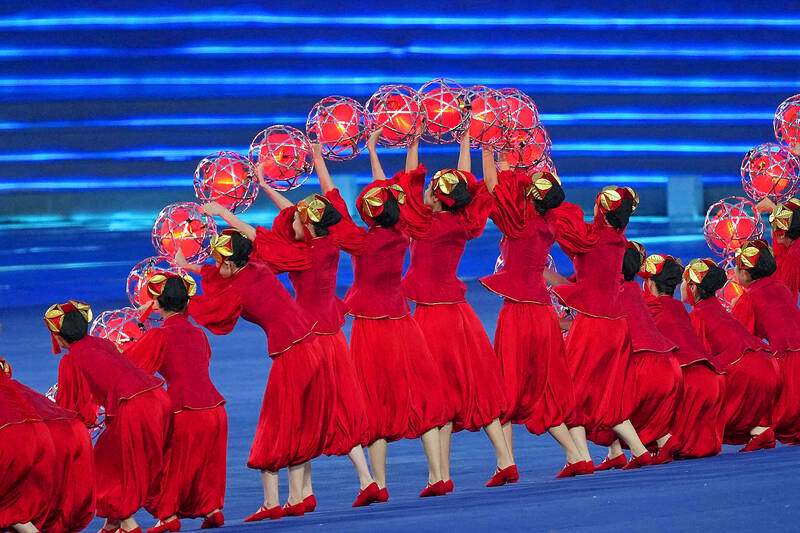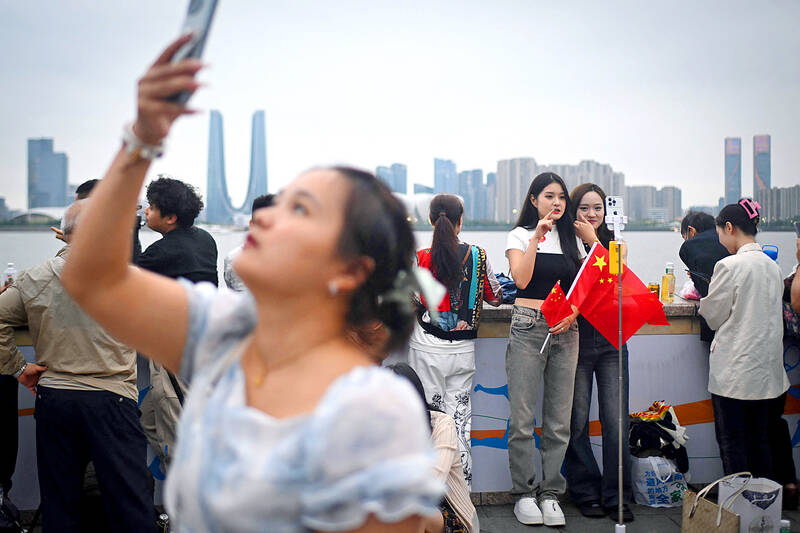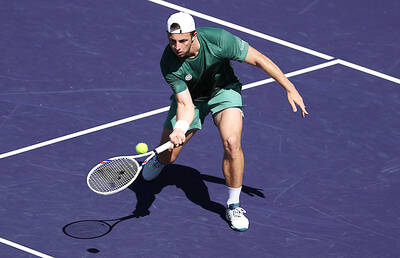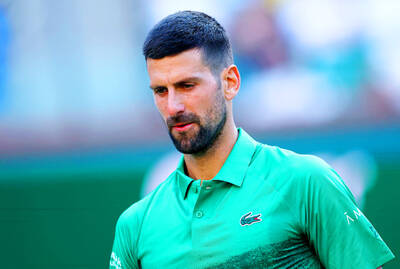Hangzhou stepped up security ahead of yesterday’s opening of the Asian Games in China, as organizers sought to get the sporting extravaganza off to a smooth start, with Chinese President Xi Jinping among the dignitaries in attendance.
Roads in a sizeable “traffic control area” around the city’s Olympic stadium were blocked off, at least one metro station was shut and other Games centers were closed ahead of a ceremony organizers described as “mesmerizing.”
Some of those making the trek toward the main stadium were left frustrated by the size of the sealed-off area.

Photo: AP
“I think it shows they’re too nervous, right?” said 45-year-old Hangzhou resident Li Jian. “I think we should be a little more confident.”
Organizers have not disclosed spending on the Games, although the Hangzhou government has said it spent more than 200 billion yuan (US$30 billion) in the five years through 2020 on transport infrastructure, stadiums, accommodation and other facilities.
Delayed a year due to China’s measures to combat the COVID-19 pandemic, the quadrennial Games are the country’s biggest sporting event in more than a decade, with more than 12,000 athletes from 45 nations competing in 40 sports.

Photo: AFP
Organizers hoped the high-tech opening ceremony would help drum up excitement for the Games. Interest at home has been muted as the economy sputters and some question the cost of hosting the event.
“We will transport the beauty of mountains and rivers directly onto the stage, using the mesmerizing combination of naked-eye 3D visual effects and virtual imagery,” Sha Xiaolan, chief director for the ceremony, told a news conference on Thursday, state media reported.
Dozens of smiling volunteers greeted arriving journalists in Hangzhou this week, with some expressing relief that the event was finally getting started.
The official slogan of the event, “Heart to Heart, @Future,” represents the goal of uniting the people and countries of Asia through these Games, officials have said, but geopolitical tensions and rivalries threatened to overshadow that effort this week.
India on Friday protested a visa issue that affected three of its athletes at the Games, leading Indian Minister of Sports Anurag Thakur to cancel his trip.
Japan’s top government spokesperson said on Tuesday that Tokyo would do its utmost to ensure the safety of Japanese nationals in China as the release of treated water from the Fukushima Dai-ichi nuclear power plant into the sea has chilled ties.
“We should promote peace through sports, adhere to the principle of goodwill towards neighbours and mutual benefit and ... resist the cold war mentality and confrontation between camps,” Xi told dignitaries including International Olympic Committee president Thomas Bach at a banquet yesterday, state news agency Xinhua reported.
A few sports had started before the opening ceremony, including table tennis. Taiwan’s men’s team on Friday played Kazakhstan in their second tie in their group.
Taiwan won 3-0 to advance to the knockout round with two victories.
Additional reporting by staff writer

Tallon Griekspoor on Friday stunned top seed Alexander Zverev 4-6, 7-6 (7/5), 7-6 (7/4) in the second round at Indian Wells, avenging a devastating loss to the German at Roland Garros last year. Zverev, the world No. 2 who is heading the field of the prestigious ATP Masters event with No. 1 Jannik Sinner serving a three-month drugs ban, is the first Indian Wells men’s top seed to lose his opening match since Andy Murray in 2017. It was a cherished win for Griekspoor, who had lost five straight matches — including four last year — to the German. That included a five-setter

Donovan Mitchell on Wednesday scored 26 points as the Cleveland Cavaliers punched their ticket to the NBA playoffs with a hard-fought 112-107 victory over the Miami Heat. A seesaw battle in Cleveland saw the Heat threaten to end the Cavs’ 11-game unbeaten streak after opening up a seven-point lead late in the fourth quarter, but the Cavs clawed back the deficit in the closing minutes to seal their 12th straight victory and a place in the post-season. The Cavaliers improved to 52-10, maintaining their stranglehold on the Eastern Conference with 20 games of the regular season remaining. Mitchell was one of six Cleveland

Five-time champion Novak Djokovic on Saturday tumbled out of the Indian Wells ATP Masters, falling in his first match to lucky loser Botic van de Zandschulp as two-time defending champion Carlos Alcaraz advanced. “No excuses for a poor performance,” 24-time Grand Slam champion Djokovic said after 37 unforced errors in a 6-2, 3-6, 6-1 defeat. “It doesn’t feel great when you play this way on the court,” he said. “But congratulations to my opponent — just a bad day in the office, I guess, for me.” Djokovic is just the latest in Van de Zandschulp’s string of superstar victims. He

Manchester United on Thursday settled for a 1-1 draw with Real Sociedad in the first leg of their Europa League round-of-16 tie. United led on Joshua Zirkzee’s goal in the 58th minute, but the hosts equalized 12 minutes later after Bruno Fernandes’ hand ball and Mikel Oyarzabal sent Andre Onana the wrong way from the penalty spot. The Europa League could be a way for United to finish the season with a trophy after crashing out of the FA Cup on Sunday. A spot in the quarter-finals is to be on the line at Old Trafford in the second leg on Thursday next